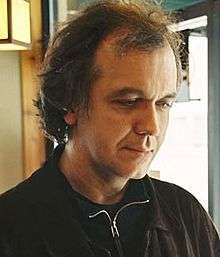Igor Vishnevetsky
| Igor Vishnevetsky | |
|---|---|
 | |
| Born |
Igor Georgievich Vishnevetsky January 5, 1964 Rostov-on-the-Don, USSR |
| Occupation | poet, novelist, scholar, filmmaker |
| Children | Ignatiy Vishnevetsky |
Igor Georgievich Vishnevetsky (Russian: Игорь Георгиевич Вишневецкий) (born January 5, 1964 in Rostov-on-the-Don, USSR) is a notable Russian poet and novelist. He has been a contributor and editor in numerous Russian literary journals and anthologies since the 1980s. Some of his work has been published in English, including a translated version of his first novel, Leningrad (2010).
Biography
Igor Vishnevetsky was born in Rostov-on-the-Don in 1964 to Georgiy and Alla Vishnevetsky. Vishnevetsky originally aspired to become a composer, and studied music in school before attending Moscow State University to pursue a degree in philology. After graduating in 1986, Vishnevetsky became an active member of the poetry and art scenes that existed in Moscow and St. Petersburg prior to the break-up of the Soviet Union.
Vishnevetsky emigrated to the United States in 1992. In 1996 he received a Ph.D. in Russian Literature from the Department of Slavic Languages of Brown University. Subsequently, he taught at Emory University for five years. In the 2000s, he has also become a notable music historian, and is considered an authority on Sergei Prokofiev and the Russian-American composer Vladimir Dukelsky.
He also was a visiting professor of Russian and Film at Carnegie Mellon University. It was in Pittsburgh where he composed his experimental novel "Leningrad" which describes dehumanizing effects of the Finno-German siege of the city during World War II and deals with transformation of former Russian capital into a Soviet city. Praised for its insights into the minds of the people who experienced the collapse of everything associated with humanity, "Leningrad" won a 2010 award for the best fiction published in Russia's leading literary periodical "Novyi mir". In 2012 it won a prestigious "New Verbal Art (Novaya Slovesnost', or NoS)" literary award.
Since 2010 he had been working on a film version of "Leningrad".[1][2] The film was completed in 2014 (a slightly shorter version in 2015) and received a number of awards.[3][4][5] Film historian and critic Andrei Plakhov called it "an absolutely amazing experiment,",[6] while film critic Evgeny Maisel considered Visnevetsky's film "a true challenge to contemporary professional film production."[7]
His son is film critic Ignatiy Vishnevetsky.
Bibliography
Collected Poetry
- Стихотворения - Poems (1992)
- Тройное зрение - Threefold Vision (1997)
- Воздушная почта: Стихи 1996—2001 - Air Mail: Poems 1996-2001 (2001)
- На запад солнца - West of the Sun (2006)
- Первоснежье - First Snow (2008)
- Стихослов - Rhymologion (2008)
Fiction
- Ленинград - Leningrad (2010)
- Острова в лагуне - Islands in the Lagoon (2013)
Translated Fiction
- Leningrad (in English, 2013)
- Leningrad (in Macedonian, 2014)
Academic Works
- Трагический субъект в действии: Андрей Белый - Tragic Subject and Action: Andrei Bely (2000)
- Andrei Bely and Sergei Solovyov in Dictionary of Literary Biography, vol. 295 (2004)
- «Евразийское уклонение» в музыке 1920-х—1930-х годов - The "Eurasianist Tendency" in the Music of the 1920s and 1930s (2005)
- Сергей Прокофьев - Sergei Prokofiev (2009)
- Arseny Tarkovsky in Dictionary of Literary Biography, vol. 359 (2011)
Feature Films
- Leningrad (2015)
External Links:
- Texts for Online Magazine "Vavilon" (in Russian)
- Recent Texts (in Russian)
References
- ↑ http://www.prokhorovfund.ru/fund/news/695/?sphrase_id=10521
- ↑ http://www.svoboda.org/content/transcript/24485493.html
- ↑ http://www.imdb.com/title/tt2982800/?ref_=nm_flmg_wr_1
- ↑ http://kinoart.ru/news/12-j-dukh-ognya-zavershilsya-pobedoj-rumynskoj-retro-dramy
- ↑ http://kinoart.ru/blogs/ejsk-2015
- ↑ http://old.ugra-news.ru/article/39532
- ↑ http://kinoart.ru/blogs/dukh-ognya-2014